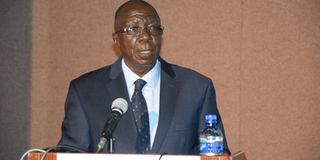Two poll observer missions give opposing views on Tanzania's Elections

EAC team leader (chairman), Sylvestre Ntibantunganya.
What you need to know:
In separate press conferences, the East African Community observer team gave a thumbs-up to the National Electoral Commission (NEC) saying they conducted free and fair elections, but Electoral Institute for Sustainable Democracy in Africa (EISA) report poked holes on the electoral process which they suggested did not meet the threshold of credible, free and fair elections.
Dar es Salaam. Two observer missions for Tanzania elections issued their preliminary reports yesterday providing opposing views of what transpired during the October 28 polls.
In separate press conferences, the East African Community observer team gave a thumbs-up to the National Electoral Commission (NEC) saying they conducted free and fair elections, but Electoral Institute for Sustainable Democracy in Africa (EISA) report poked holes on the electoral process which they suggested did not meet the threshold of credible, free and fair elections.
The EAC team leader (chairman), Sylvestre Ntibantunganya, said that after monitoring the whole process from preparations to the preliminary announcement of the results, they found that the exercise was conducted under free and fair circumstances.
“In areas where the team conducted the observation exercise, they are satisfied with the way the election exercise was conducted,” the EAC team leader said.
“The team advises opposition parties to ensure that they resolve their grievances in accordance with the requirements of the Constitution and the laws governing elections.”He also urged them to prioritize the interests of Tanzanians, especially to avoid any actions that could lead to a breach of peace and stability.
While appreciating Tanzania for the invitation to observe the 2020 General Election and its commitment to fully fund the cost of its electoral administration, enhancing the sovereignty of the country the EISA mission team established notable loopholes that hindered the October 28 polls from being credible, free and fair. Announcing to the media the team’s preliminary statement, Pansy Tlakula (leader), former chairperson of the Electoral Commission of South Africa highlighted areas of concern that impacted the 2020 General Election.
“…The mission observes that several directives were issued close to the elections,” she said.
While the issuance of these directives could assist in bringing clarity to specific matters of law and procedure, she said, they could also create disruption and uncertainty when issued close to elections and without sufficient stakeholder consultations
The team said that the political environment in which the 2020 polls took place was less open and less tolerant than previous elections in Tanzania, including the limitation of political campaigning, freedom of assembly, freedom of speech and freedom of expression. Ms Tlakula said amendment to Tanzania’s legal and electoral framework: the net effect of which was to decrease the levels of openness and opportunity for all stakeholders to contest on an equal or at least equitable footing.
She observed that amendments to the electoral regulations, including through certain directives issued by Tanzania regulators and state institutions, heightened the levels of uncertainty about the legality of actions which occur ordinarily in the course of election observation. “This includes but is not limited to restrictions to the conduct of international observers themselves which do not fall within international guidelines and standards,” she noted.
She said that access to election information by voters, political parties and other stakeholders: Limited televised access to parliamentary proceedings, restrictions on freedoms of the media and internet during the voting process were all examples of ways in which information was limited during the 2020 electoral period.
“The instability and loss of life due to election-related violence, particularly in Zanzibar, is of grave concern to the team, who once again appeals for calm and orderly conduct by all stakeholders to allow the electoral process to conclude without further loss of life or serious injury,” observed Ms Tlakula.
On their recommendations, the EISA team calls for the review of the legal framework to provide mechanisms for redress of disputes arising from the presidential election.
“In order to enhance independence of the NEC, the government should consider adoption of a two-tier appointment process where the NEC commissioners are subjected to parliamentary vetting before approval,” she opined.
She further said that considerations should be made to provide for hiring of ad hoc staff to help the Commission in conducting elections as opposed to secondment of public servants.
“To enhance transparency, NEC should consider timely and comprehensive consultation with all electoral stakeholders. Should consider reviewing the accreditation procedures for citizen observers to ensure timely and efficient consideration of accreditation requests,” she noted.
To make the election process competitive and provide a level playing field, NEC should consider reviewing the direct nomination of unopposed candidates, the team recommended.




